Limit-Phenomena and Phenomenology in Husserl
Published by Rowman & Littlefield International Ltd
Unit A, Whitacre Mews, 2634 Stannary Street, London SE11 4AB
www.rowmaninternational.com
Rowman & Littlefield International Ltd. is an affiliate of Rowman & Littlefield
4501 Forbes Boulevard, Suite 200, Lanham, Maryland 20706, USA
With additional offices in Boulder, New York, Toronto (Canada), and Plymouth (UK)
www.rowman.com
Copyright 2017 by Anthony J. Steinbock
All rights reserved. No part of this book may be reproduced in any form or by any electronic or mechanical means, including information storage and retrieval systems, without written permission from the publisher, except by a reviewer who may quote passages in a review.
British Library Cataloguing in Publication Data
A catalogue record for this book is available from the British Library
ISBN:HB 978-1-7866-0498-9
PB 978-1-7866-0499-6
Library of Congress Cataloging-in-Publication Data
Names: Steinbock, Anthony J., author.
Title: Limit-phenomena and phenomenology in Husserl / Anthony J. Steinbock.
Description: Lanham : Rowman & Littlefield International, 2017. | Includes bibliographical references and index.
Identifiers: LCCN 2017022352 (print) | LCCN 2017032303 (ebook) | ISBN 9781786605009 (electronic) | ISBN 9781786604989 (cloth : alk. paper) | ISBN 9781786604996 (pbk. : alk. paper)
Subjects: LCSH: Phenomenology. | Individuation (Philosophy) | Husserl, Edmund, 18591938.
Classification: LCC B829.5 (ebook) | LCC B829.5 .S6653 2017 (print) | DDC 193dc23
LC record available at https://lccn.loc.gov/2017022352
 The paper used in this publication meets the minimum requirements of American National Standard for Information SciencesPermanence of Paper for Printed Library Materials, ANSI/NISO Z39.481992.
The paper used in this publication meets the minimum requirements of American National Standard for Information SciencesPermanence of Paper for Printed Library Materials, ANSI/NISO Z39.481992.
Printed in the United States of America
For my grandparents,
Dobe and Hyman Steinbock,
Marie and Joseph Fanuele
Preface
One of the main virtues of phenomenologythough many there may beis that phenomenology is an opening to the matters themselves. This requires of those practicing phenomenology a flexibility of mind, and a genuine open disposition to follow the course of the phenomena as they give themselves, no matter how they give themselves. Certainly, this does not mean that one just talks about the things willy-nilly, as if this openness were arbitrary speculation about whatever comes to mind; there is a rigor to phenomenological methodology. In my view, this means that phenomenology should be mindful of two things.
First, it is incumbent upon those practicing phenomenology to be attentive to what give themselves in the way that they give themselves, even if these matters do not conform to our usual habits of thought and preconceptions about what can appear. No matter how paradoxical this may sound, it requires being open to being struck by the matters, even if one cannot anticipate being struck by what might appear. It requires being open to the possibility that there might be modes of givenness, kinds of evidence, and modalities of experience that do not follow the strict pattern of the way in which objects of perception and objects of thought give themselves to an individual perceiver or to an autonomous thinker. The latter is a particularly Modern presuppositiona presupposition that is not all the more valid because it is all the more recent. For example, the other person, the Holy, and the earth give themselves with their own styles of evidence, as their own kind of ground, with their own problems of deception, their own modalities accompanied by their questions of modalizations, temporality, relations to otherness, and so on. Where the emotions are concerned, the order of the heart has its own reasons as Pascal, and Scheler after him, suggests. If we restrict in advance what is going to count as experienceable, we may just be cutting short fundamental aspects of who we are as persons and as living creatures.
Second, while phenomenology demands a freedom and non-dogmatism in exegesis, creativity, openness, and inventiveness cannot thereby be recourse to arbitrariness. By virtue of its openness to all phenomena, phenomenology is inherently inter- or cross-disciplinary, without it being a philosophy that is then applied to things or concerns outside of philosophy in order then to be relevant. But this also means that those doing phenomenology have to consider how to approach and to describe these matters philosophically, no matter how open we are to them.
There are at least two movements peculiar to a philosophical style that wants to call itself phenomenological: a description of the how and the what of experience, or again, the modes of givenness and their a priori structures. If phenomenology were only a matter of describing what is given to me now, it would not be distinguishable from a sophisticated kind of autobiography or historiography. A purely historical or narrative approach does not suffice. However, if phenomenology were only a description of essential structures, it would hardly be distinguishable from a purely formalist study, a structuralism, a regional ontology, or a mere ontology of the lifeworld.
With these two movements in play, namely, an attentiveness to the how and the what, or again, the inquiry into modes of givenness and essential or a priori structures, phenomenology can recognize itself precisely as transcendental phenomenology. For many, transcendental phenomenology means positing or insisting upon transcendental subjectivity without however understanding that transcendentally, subjectivity for Husserl is essentially the human being viewed according to its powers and limits of meaning-giving. But in my view this can still be an arbitrary limitation on what transcendental phenomenology can mean. For at a minimum, transcendental phenomenology concerns the dimensions of meaning or sense-constitution and being constituted, and the open range of possibility expressed as a priori structures. If Husserl is a philosopher of essences, it is only because essences for him do not confine things to the necessary, but open to a range of the possible.
Phenomenology does not posit a world beyond the one lived; nor does it project a double, unknowable subjective sphere. Rather, examining the powers and limits of sense-constitution, it strives no longer to take for granted how meaning and sense emerges on all levels of experience from first-person and even second-person perspectives. As transcendental, phenomenology attempts to give an account of transcendence in terms of modes of givenness and a priori structures of experience. It only stops at consciousness, the subject or the lived-body, and so forth depending upon the methodological scope of the investigation. These need not be necessary stopping points. In this way, transcendental phenomenology can be fully concordant with what others have understood as a hermeneutic phenomenology or an existential phenomenology.
If this is the case, then, why should an appeal be made to the phenomenology of Edmund Husserl? It is not sufficient that he was the so-called father of phenomenology, since others, too, have taken up this project. Have others not done it better, more clearly, or more systematically: thinkers like Max Scheler, Maurice Merleau-Ponty, Martin Heidegger, Jean-Paul Sartre, or in a different register, Paul Ricoeur or Emmanuel Levinasjust to name a handful?
One can, of course, treat Husserl in a very rigid manner. This might happen by approaching his works merely in the manner of the philologist, or by restricting Husserl research to the piety of thought. Some thinkers might tend to curb his thoughts to a fixed past, confining exegesis to a conformity of unswerving ideas, relegating novelty to feebleness of mind, and actingwith all good intentionsas closed-minded judges or historians of scripture. No wonder Paul Ricoeur referred to himself and to others like him (with just a touch of delight and irony, I suppose) as Husserl Heretics! But we need not go this far, despite its rhetorical merit.

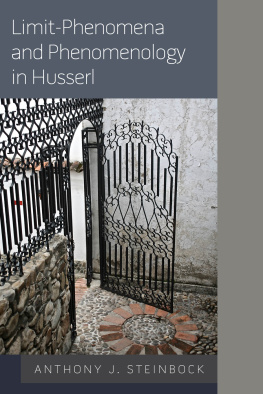
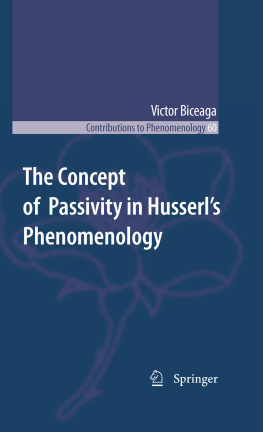
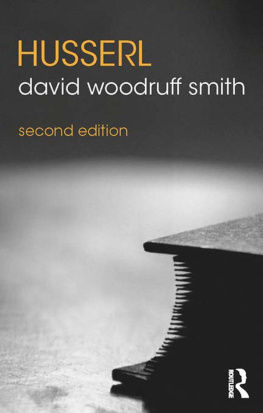
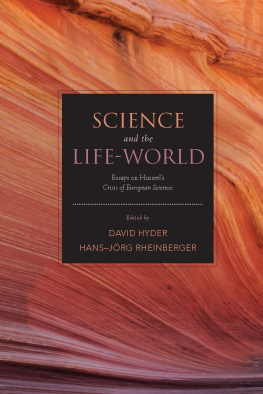

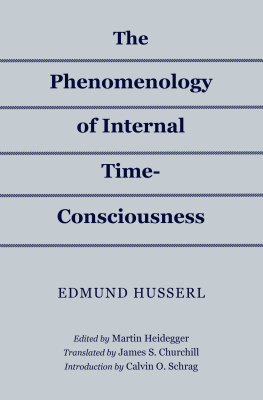
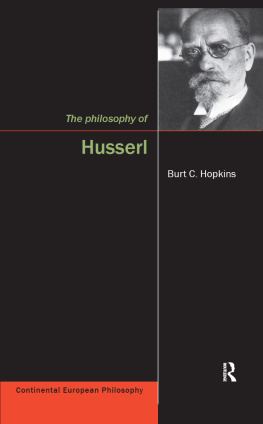

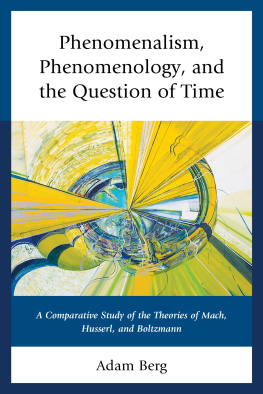
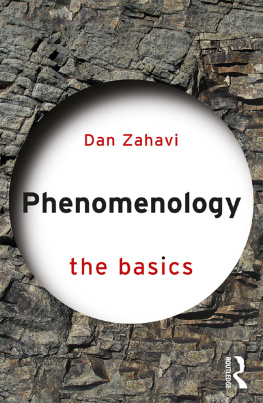
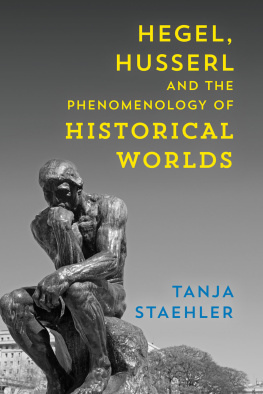
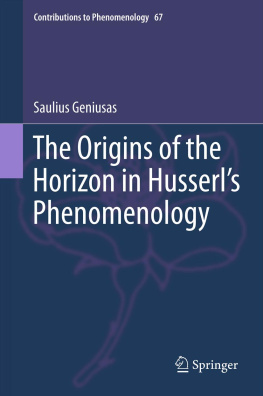
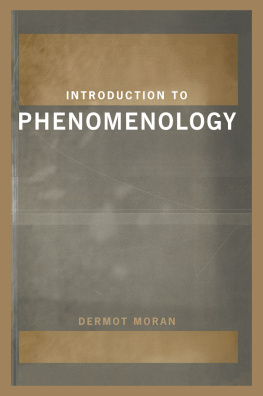


 The paper used in this publication meets the minimum requirements of American National Standard for Information SciencesPermanence of Paper for Printed Library Materials, ANSI/NISO Z39.481992.
The paper used in this publication meets the minimum requirements of American National Standard for Information SciencesPermanence of Paper for Printed Library Materials, ANSI/NISO Z39.481992.